AdTech and MarTech are the dynamic forces shaping the modern business landscape. In a world driven by digital technologies, advertising technology (AdTech) and marketing technology (MarTech) have become indispensable tools for startups, businesses, and companies striving to establish a robust online presence and effectively engage with their target audience.
Aloa, a leading expert in software outsourcing, recognizes the challenges that businesses and startups face when navigating the complexity of these technologies. From optimizing ad spend and managing digital advertising campaigns to harnessing the power of data management platforms, Aloa assists in streamlining marketing efforts and ensuring businesses make the most of their advertising budgets.
In this blog, we will delve into the core differences between AdTech and MarTech, exploring how each plays a unique role in advertising and marketing strategies. We will uncover real-world use cases, highlighting the impact of AdTech platforms on programmatic advertising and how MarTech solutions drive customer relationship management and content management systems.
Afterward, you will understand how these technologies can propel your marketing campaigns to new heights. Stay tuned to harness the full potential of these technologies in today's competitive business environment.
Let's jump in!
What are AdTech and MarTech?
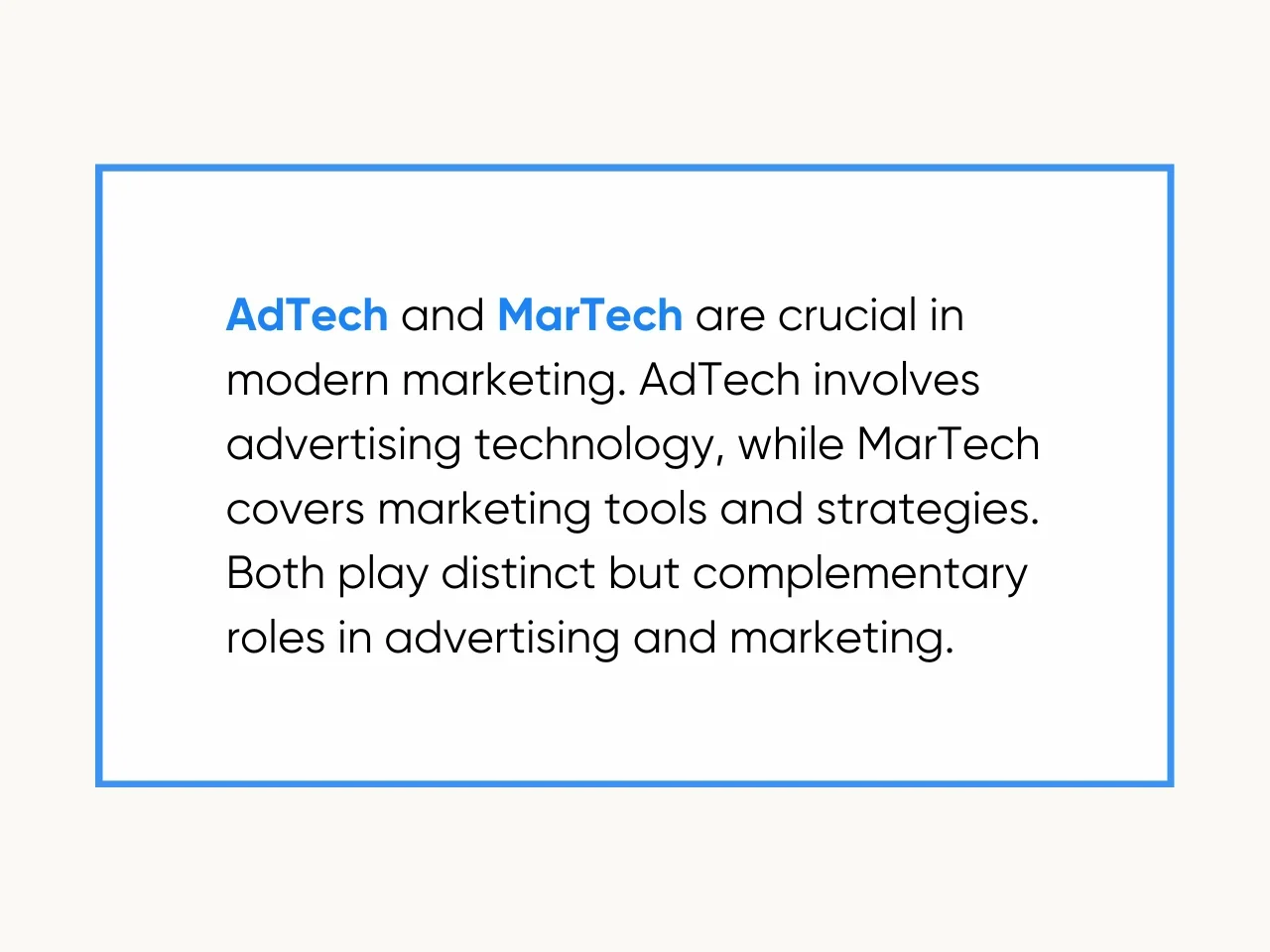
AdTech and MarTech are essential components of modern marketing. AdTech refers to advertising technology, while MarTech is short for marketing technology. These two terms encompass a wide range of tools and strategies that serve different functions in advertising and marketing.
In recent years, AdTech and MarTech have become increasingly intertwined, with marketing teams harnessing both to create impactful advertising content, manage social media, and optimize their strategies across various channels.
These technologies, powered by machine learning and data analytics, have revolutionized the advertising landscape, enabling businesses to deliver personalized content to potential customers and maximize ad impressions. Whether it's Google Ads, social media management tools, or examples of AdTech tools, AdTech and MarTech are shaping the future of digital marketing, offering businesses effective tools to navigate the complex world of online advertising.
Core Differences Between AdTech and MarTech
AdTech and MarTech are vital components of modern business strategies, each serving distinct purposes and functions. To understand their roles better, let's delve into the core differences between these essential elements:
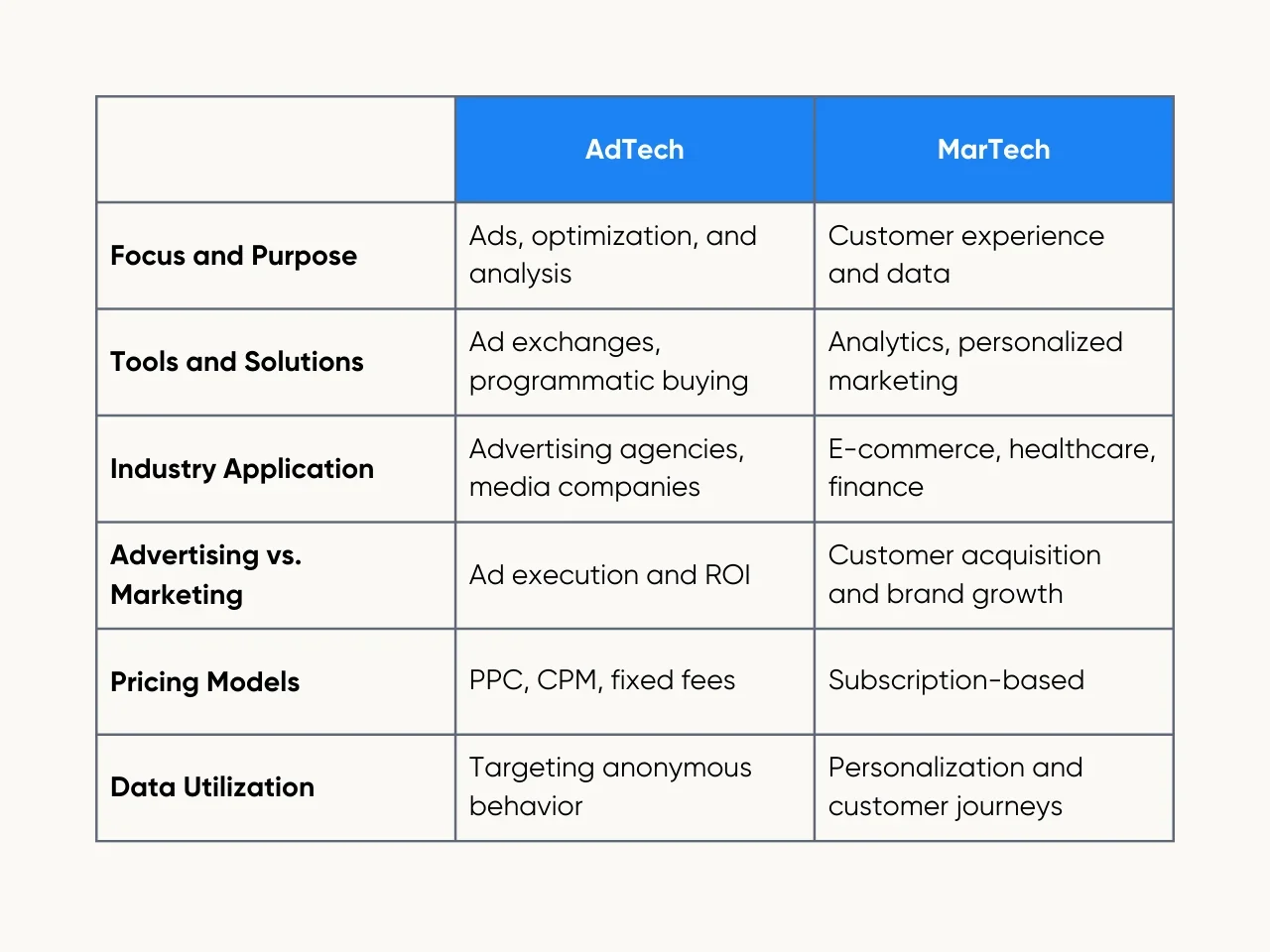
Focus and Purpose
- AdTech: AdTech primarily concentrates on advertising and promotion. It involves the tools and technologies used to deliver, optimize, and analyze advertisements across various platforms, including display ads, search engines, and social media.
- MarTech: MarTech is centered around marketing processes and enhancing the overall customer experience. It encompasses various tools and solutions for managing customer data, content marketing, SEO tools, and more.
Tools and Solutions
- AdTech: AdTech relies on tools such as ad exchanges, ad networks, and programmatic ad buying to buy and sell ad space efficiently. It aims to reach a specific target audience through targeted ad campaigns.
- MarTech: MarTech uses customer data and analytics tools to understand customer behavior and preferences. It facilitates personalized marketing strategies, improving customer engagement and retention.
Industry Application
- AdTech: AdTech is often associated with advertising agencies and media companies. It helps them manage ad inventory, conduct campaigns, and optimize ad spend.
- MarTech: MarTech finds application in various industries beyond advertising, including e-commerce, finance, healthcare, and more. It assists in building and managing a robust marketing stack.
Advertising vs. Marketing
- AdTech: AdTech deals with the execution and delivery of advertising content to target audiences. It focuses on placing ads in a suitable space to maximize visibility and ROI.
- MarTech: MarTech focuses on the broader spectrum of marketing, encompassing strategies for customer acquisition, retention, and overall brand growth. It includes tools for content creation, email marketing, and social media marketing.
Pricing Models
- AdTech: AdTech often involves pricing models like pay-per-click (PPC) or cost-per-mille (CPM), where advertisers pay for clicks or impressions. It can also include fixed fees for ad placements.
- MarTech: MarTech solutions are typically subscription-based, and pricing models depend on the specific tools and services. They may involve monthly or annual fees.
Data Utilization
- AdTech: AdTech heavily relies on customer data for targeting and optimization but often focuses on anonymous user behavior and preferences data.
- MarTech: MarTech strongly emphasizes collecting, analyzing, and utilizing customer data to create personalized experiences and enhance customer journeys.
AdTech Use Cases
AdTech has revolutionized how businesses promote their products and services. This technology encompasses many tools and platforms designed to streamline advertising efforts and maximize their impact.
Let's delve into five critical AdTech use cases demonstrating its versatility and effectiveness.
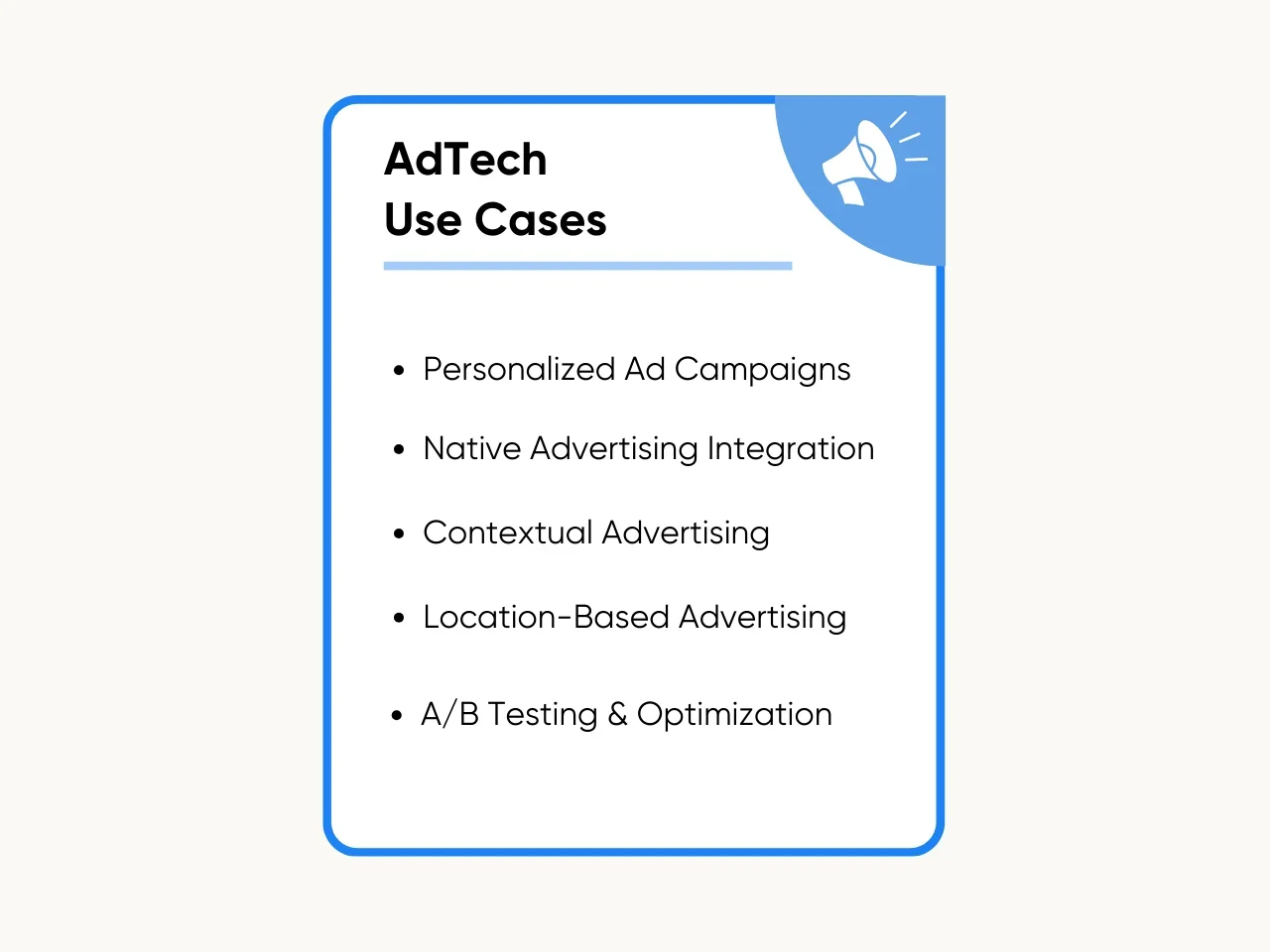
Personalized Ad Campaigns
Implementation and AdTech development empower businesses to create personalized ad campaigns tailored to user preferences and behavior. By harnessing data analytics and AI-driven insights, companies can serve highly relevant advertisements that resonate with their target audience. This level of personalization enhances user engagement and boosts conversion rates, ultimately driving business growth.
Native Advertising Integration
AdTech integrates native advertising into digital platforms, ensuring that ads blend seamlessly with users' content. This non-disruptive approach enhances user experience and increases the likelihood of ad engagement. For businesses and startups, native advertising proves to be an effective way to convey their messages unobtrusively.
Contextual Advertising
AdTech platforms excel in delivering ads in context, aligning them with the surrounding content or user activities. This ensures that advertisements are both relevant and timely. For instance, a travel website can use AdTech to display vacation package ads when users read travel-related articles. This contextual approach maximizes the chances of conversion.
Location-Based Advertising
AdTech leverages geolocation data to deliver location-specific ads to users' devices. Businesses can target potential customers in specific areas, driving foot traffic to physical stores or promoting location-specific offers. Location-based advertising is precious for brick-and-mortar establishments and service providers.
A/B Testing and Optimization
AdTech tools enable A/B testing of ad creatives, headlines, and strategies. Businesses can experiment with different approaches and measure their effectiveness in real-time. This data-driven optimization ensures that advertising budgets are allocated efficiently and campaigns continually evolve to deliver better results.
MarTech Use Cases
Marketing Technology is vital to modern marketing strategies. It encompasses various tools and platforms that help businesses engage with their audience, analyze data, and optimize marketing campaigns.
Let's explore five essential MarTech use cases demonstrating its effectiveness in achieving marketing objectives.
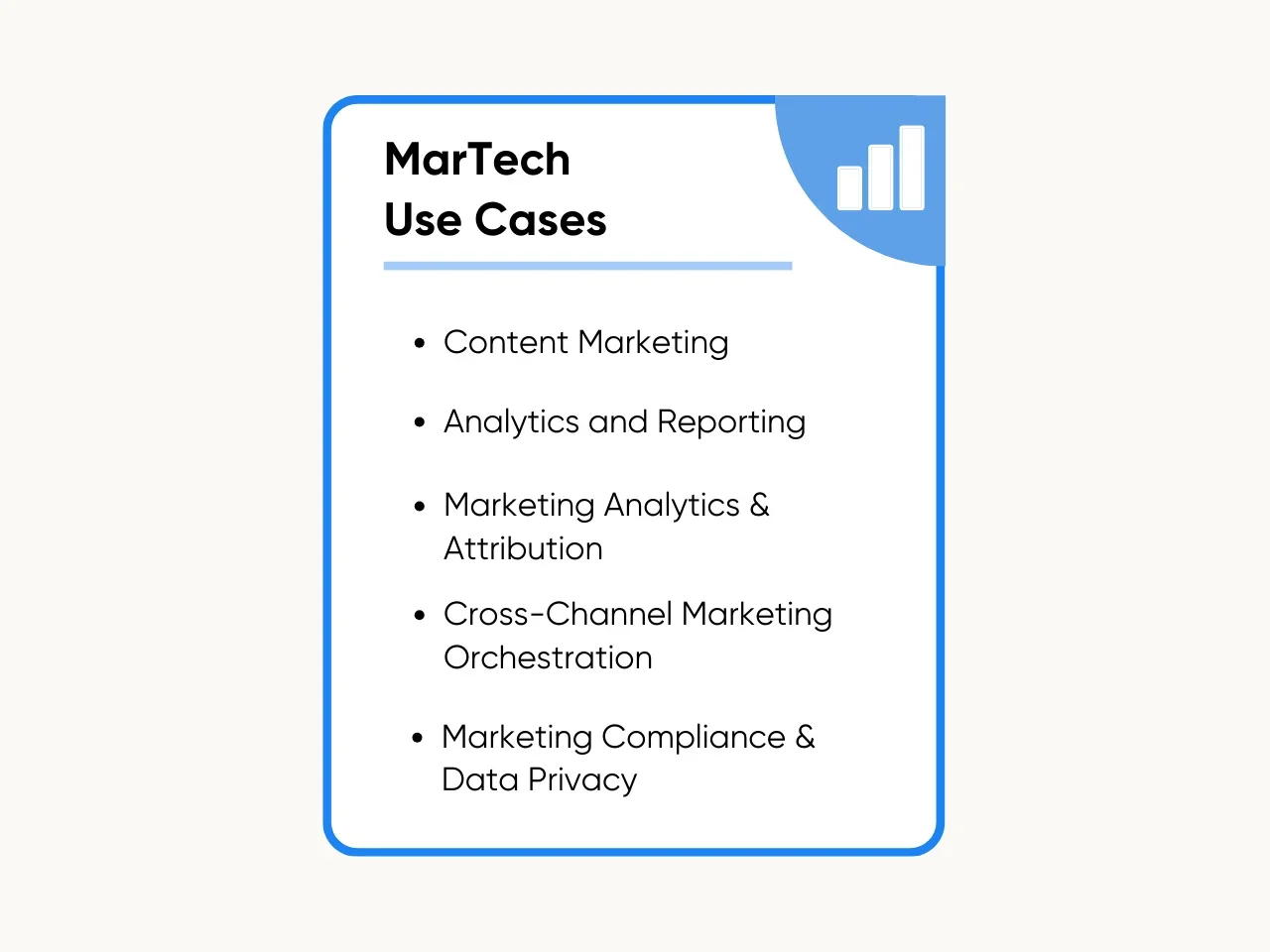
Content Marketing
Content marketing is a cornerstone of modern marketing strategies, and MarTech tools amplify its effectiveness. Content management systems, analytics platforms, and AI-driven content creation tools empower businesses to produce and distribute compelling content. Startups can establish thought leadership and engage their target audience through MarTech-driven content marketing.
Analytics and Reporting
MarTech provides advanced analytics and reporting capabilities, allowing businesses to track and measure the performance of their marketing campaigns. Real-time data insights enable quick adjustments to strategies, leading to improved ROI. For startups, this means staying agile and adapting to market changes for sustained growth.
Marketing Analytics and Attribution
MarTech platforms provide sophisticated marketing analytics and attribution models. Businesses can track the effectiveness of various marketing channels, understand customer journeys, and allocate budgets strategically. Startups benefit from data-driven decision-making, ensuring that marketing resources are allocated wisely.
Cross-Channel Marketing Orchestration
Effective marketing often involves multiple channels, and MarTech platforms seamlessly orchestrate campaigns across these channels. Whether email, social media, web, or mobile, MarTech ensures consistent messaging and engagement.
Marketing Compliance and Data Privacy
MarTech compliance and data protection solutions are crucial in an era of increasing data privacy regulations. They help businesses adhere to regulations such as GDPR and CCPA, avoiding legal issues and building customer trust.
Key Functionalities of AdTech and MarTech
In digital marketing, AdTech and MarTech are two critical players that have emerged. Understanding their key functionalities is essential for businesses striving to stay ahead in the digital game.
Features of AdTech Platforms
AdTech is a suite of tools and solutions designed to streamline and optimize advertising campaigns across various channels. Here are ten key features that make AdTech platforms indispensable:
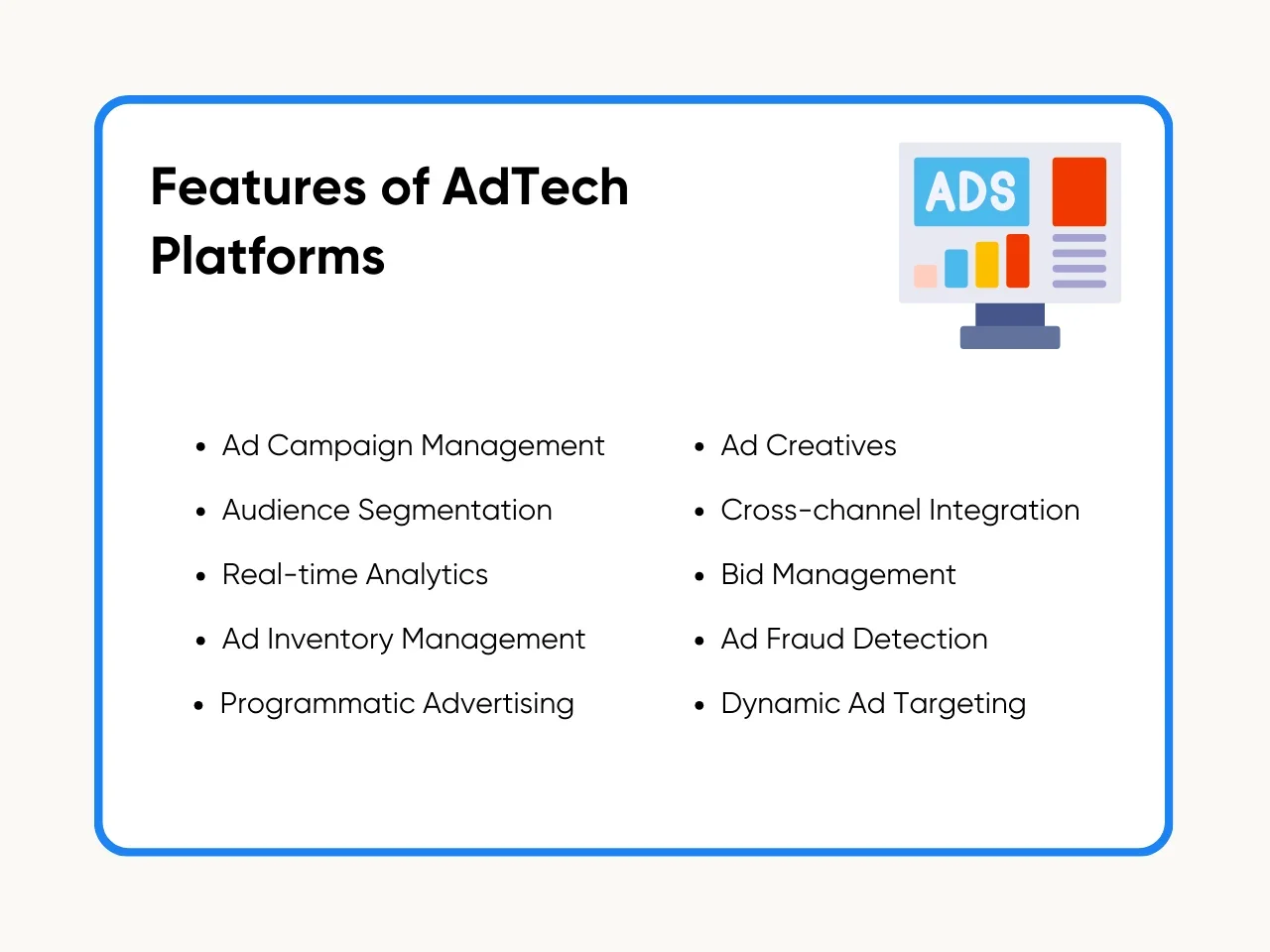
- Ad Campaign Management: AdTech platforms offer robust tools to create, manage, and optimize advertising campaigns across multiple channels, from social media to display ads.
- Audience Segmentation: They enable precise targeting by segmenting audiences based on demographics, behavior, and preferences, ensuring ads reach the right people at the right time.
- Real-time Analytics: AdTech provides instant access to campaign performance data, allowing advertisers to make data-driven decisions and adjust strategies on the fly.
- Ad Inventory Management: These platforms help publishers manage ad space inventory efficiently, maximizing revenue potential.
- Programmatic Advertising: AdTech utilizes programmatic buying and selling techniques to automate ad placements, making the process more efficient and cost-effective.
- Ad Creatives: AdTech tools facilitate the creation of engaging and personalized ad creatives, enhancing user engagement and conversion rates.
- Cross-channel Integration: AdTech integrates with various advertising channels, providing a unified view of campaigns across platforms.
- Bid Management: Automated bidding strategies optimize ad spending, ensuring advertisers get the most value for their budget.
- Ad Fraud Detection: AdTech platforms incorporate advanced algorithms to detect and prevent ad fraud, safeguarding ad budgets from wastage.
- Dynamic Ad Targeting: AdTech allows for dynamic content personalization, serving tailored ads to users based on their preferences and behaviors.
Features of MarTech Platforms
Marketing Technology focuses on improving marketing efforts, customer engagement, and data-driven decision-making. Let's explore the ten key features that make MarTech platforms indispensable for modern businesses:
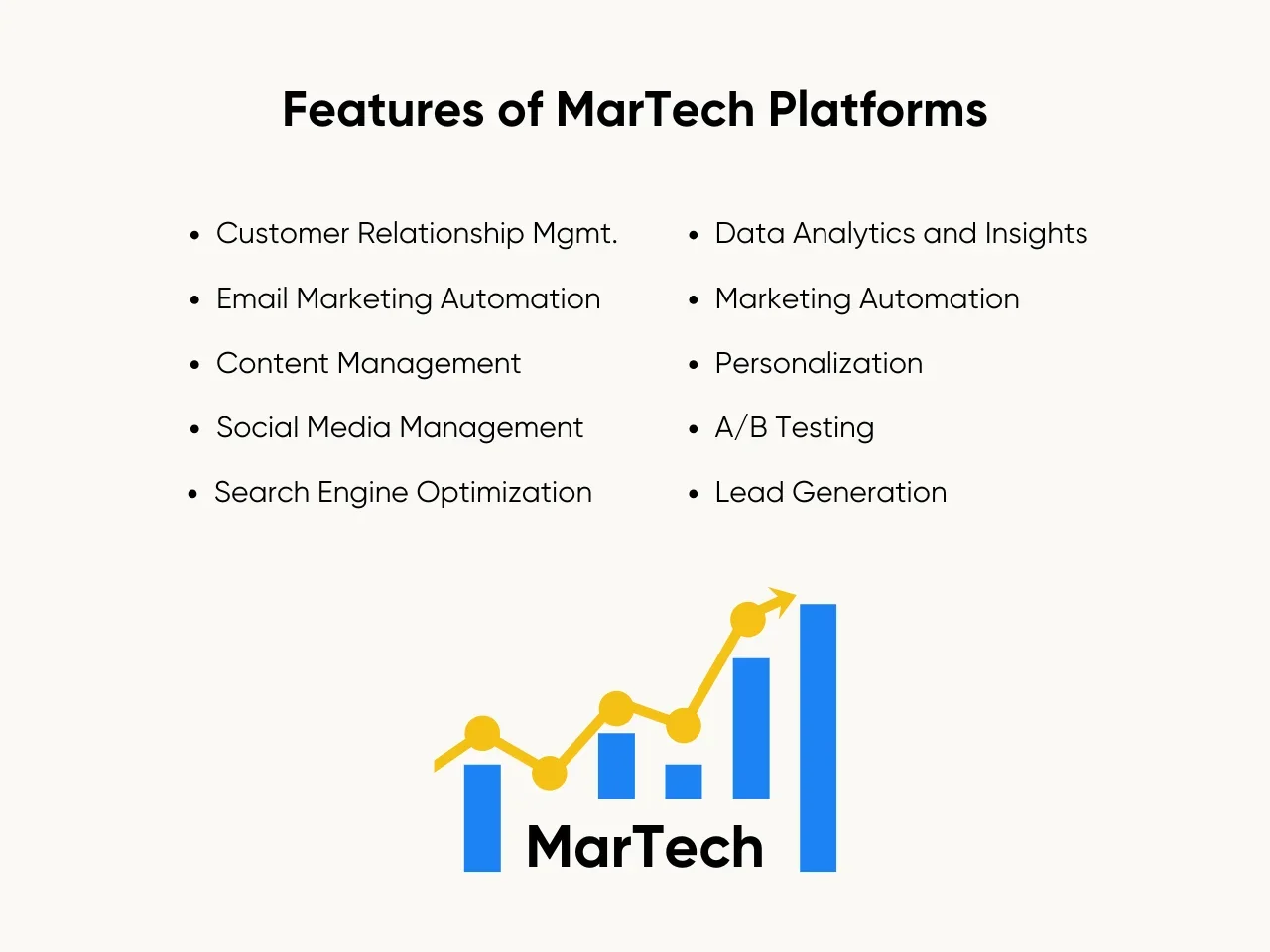
- Customer Relationship Management (CRM): MarTech platforms offer robust CRM solutions to manage and nurture customer relationships, improving customer retention and loyalty.
- Email Marketing Automation: They enable automated email campaigns, including personalized messages, drip campaigns, and follow-ups, enhancing customer engagement.
- Content Management: MarTech tools streamline content creation, publishing, and management, ensuring consistent and relevant messaging across channels.
- Social Media Management: MarTech platforms simplify social media scheduling, monitoring, and analytics, helping businesses maintain a solid online presence.
- Search Engine Optimization (SEO): MarTech incorporates SEO tools that optimize website content and improve search engine rankings, driving organic traffic.
- Data Analytics and Insights: These platforms provide in-depth analytics, helping marketers measure the impact of their campaigns and make data-driven decisions.
- Marketing Automation: MarTech automates repetitive marketing tasks, freeing time for strategic planning and creative endeavors.
- Personalization: They enable personalized marketing efforts by collecting and analyzing customer data to deliver tailored experiences.
- A/B Testing: MarTech platforms facilitate A/B testing to refine marketing strategies and identify the most effective messaging and designs.
- Lead Generation: They support lead generation efforts through landing pages, forms, and lead scoring, helping businesses identify and nurture potential customers.
Benefits of AdTech and MarTech for Business and Startups
AdTech and MarTech have become indispensable tools for businesses and startups, revolutionizing how they operate in the digital age. These technologies offer a myriad of benefits that go beyond just advertising and marketing.
Let's delve into five crucial advantages that AdTech and MarTech bring.
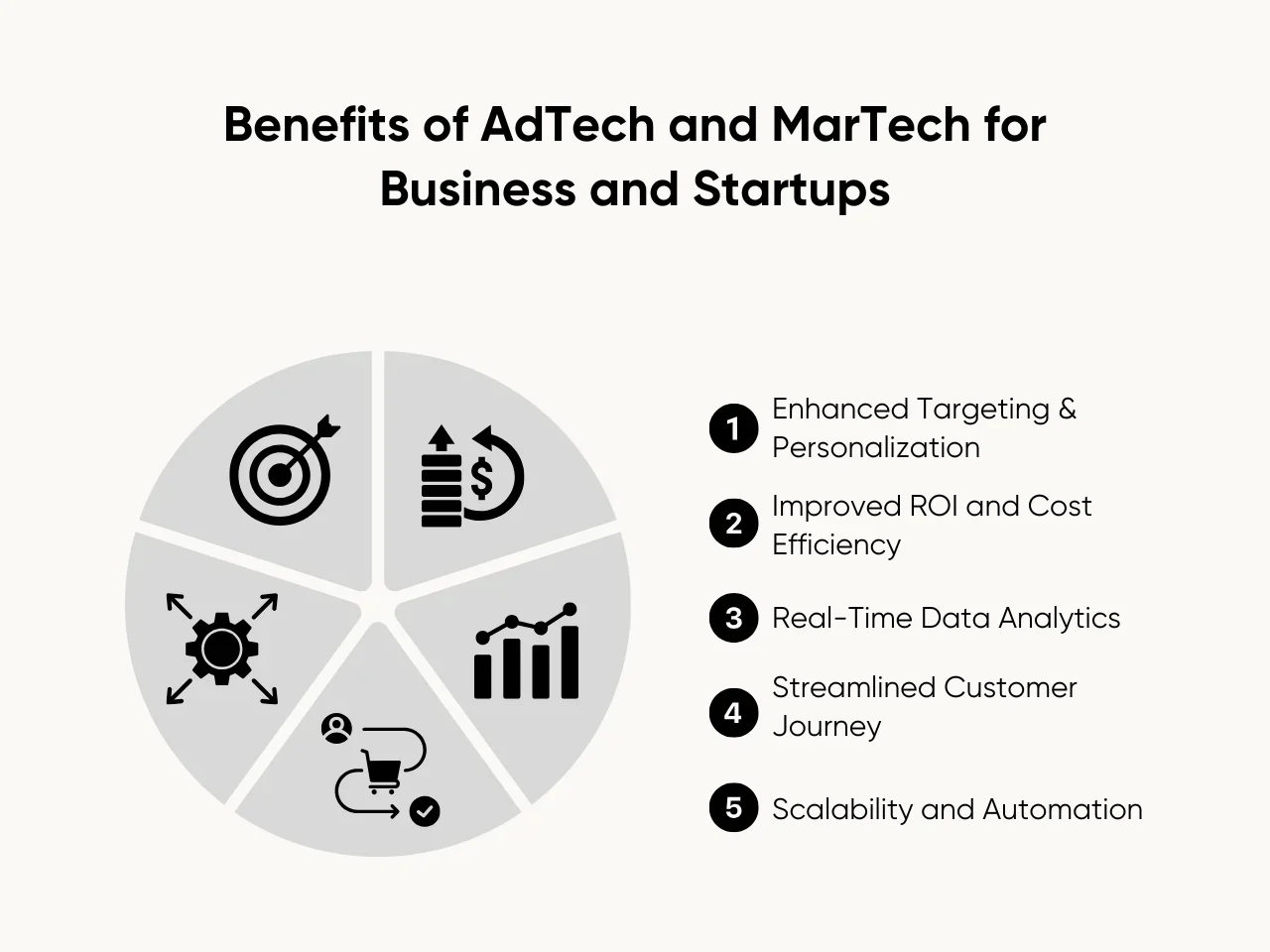
Enhanced Targeting and Personalization
AdTech and MarTech empower businesses to reach their target audience with precision. These technologies allow for highly personalized marketing campaigns through data analysis and AI-driven algorithms. Businesses can tailor their messages by understanding consumer behavior and preferences, increasing engagement and conversion rates. This means a cost-effective way for startups to connect with potential customers genuinely interested in their products or services.
Improved ROI and Cost Efficiency
One of the standout benefits of AdTech and MarTech is their ability to optimize ad spend. These tools help businesses allocate their budgets more effectively by identifying the most profitable channels and strategies. Often operating with limited resources, startups can stretch their marketing dollars further, ensuring that every investment yields maximum returns. This financial prudence is crucial for their growth and sustainability.
Real-Time Data Analytics
AdTech and MarTech provide real-time data analytics, giving businesses instant insights into their marketing efforts. This immediate feedback loop allows for quick adjustments and optimizations. For startups, this means the ability to adapt and pivot their strategies swiftly in response to changing market conditions. Timely data also helps identify trends, enabling proactive decision-making.
Streamlined Customer Journey
Customer journey mapping is a critical aspect of marketing, and AdTech and MarTech excel in this regard. These tools help create a seamless and consistent customer experience across various touchpoints. For businesses, this leads to increased customer satisfaction and loyalty. Startups, in particular, can benefit from establishing a solid brand identity and fostering trust from the outset.
Scalability and Automation
Scalability is a significant concern for established businesses and startups. AdTech and MarTech solutions are designed to grow with the company's needs. They offer automation capabilities that reduce manual tasks, freeing up valuable time and resources. Startups can scale their marketing efforts without significantly expanding their teams, allowing them to maintain agility and efficiency.
Key Takeaway
In business and startups, the challenges are diverse and demanding. Staying ahead of MarTech and AdTech trends in the competition, reaching the right audience, and ensuring efficient marketing strategies are some hurdles businesses encounter. This is where the significance of AdTech and MarTech becomes evident.
These two technologies are imperative for businesses to thrive. AdTech empowers companies to target their audience precisely, optimize ad campaigns, and maximize ROI. MarTech equips businesses with the tools to streamline marketing efforts, automate processes, and nurture customer relationships.
It is crucial to implement these two technologies seamlessly. These technologies enable data-driven decision-making, personalized customer experiences, and efficient resource allocation. By harnessing it, businesses can elevate their strategies, achieve higher conversion rates, and drive growth.
Connect with us at [email protected] to explore how AdTech and MarTech can revolutionize your business, helping you overcome challenges and thrive in the competitive landscape.

